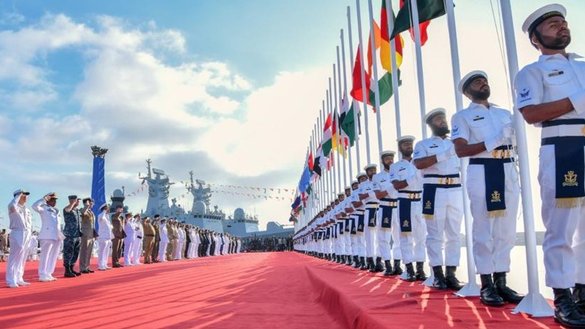The successful multinational AMAN-23 naval exercise, hosted by Pakistan, will augment security co-operation among regional and extra-regional navies to ensure peace and combat maritime terrorism, say officials and analysts.
Fifty-one countries, including the United States -- with their ships, aircraft, and special operations forces as well as observers -- participated in the AMAN-23 drills, which started on February 10 in the Arabian Sea off the coast of Karachi.
The eighth edition of the multinational naval exercise ended on February 14 after an International Fleet Review of the Pakistan Navy (PN) and foreign naval ships.
Ambassadors, high commissioners, senior military officers and defence and naval attachés of various countries witnessed the Fleet Review.

Officers from various navies salute their flags during the flag raising ceremony of the AMAN-23 drill in Karachi on February 10. [Pakistan Navy)
![Pakistani Prime Minister Shehbaz Sharif February 14 witnesses the International Fleet Review of the Pakistan Navy and foreign naval ships during the concluding ceremony of the AMAN-23 drill. [Shehbaz Sharif/Twitter]](/cnmi_pf/images/2023/02/15/40777-pf_aman_3-585_329.jpg)
Pakistani Prime Minister Shehbaz Sharif February 14 witnesses the International Fleet Review of the Pakistan Navy and foreign naval ships during the concluding ceremony of the AMAN-23 drill. [Shehbaz Sharif/Twitter]
The PN's multinational AMAN-23 exercise will make the region more peaceful and secure with the combined efforts of all stakeholders, said Pakistani Prime Minister Shehbaz Sharif, who was the chief guest at the ending ceremony.
"This multinational event reflects Pakistan's resolve to work with friends and partners to address the shared challenges of terrorism, piracy and narcotics in the maritime domain," Sharif said.
AMAN-23 was divided into two distinct phases -- harbour and sea.
The harbour phase involved activities such as seminars, operational discussions, professional demonstrations and international get-togethers.
The sea phase included tactical manoeuvres and exercises related to maritime security matters such as anti-piracy and counter-terrorism, search-and-rescue, gunnery firings and air defence.
'Boosting regional stability'
Pakistan has been holding the AMAN biennial exercise since 2007.
The steady increase in the number of participating countries in the AMAN drills since their inception shows the international community's appreciation of Pakistan's commitment to regional peace and security, according to observers.
In 2007, 28 countries took part in the exercise. Despite COVID-19 restrictions, that number grew to 43 countries by 2021.
"The rise in participants in the AMAN exercises shows the eagerness and enthusiasm of regional countries ... to support Pakistan's ongoing regional and international initiatives for strengthening maritime security in the Indian Ocean region," said Saleem Siddiqui of Karachi, an international relations professor.
"The exchange of experiences and expertise among naval sailors of the participating countries is helping repel the threat of piracy in areas of intensive shipping," he said.
Pakistan has a long history of international naval co-operation.
In 2004, Pakistan joined the US-led Combined Maritime Forces (CMF), a 34-nation coalition that "exists to uphold the International Rules-Based Order ... by countering illicit non-state actors on the high seas", according to the CMF's website.
The CMF protects approximately 8.3 million square km of international waters and is headquartered at the US naval base in Bahrain.
Pakistan participates in two of the CMF's four task forces: Combined Task Force (CTF) 150, which protects maritime security outside the Gulf, and CTF 151, which fights piracy.
Last April, a PN guided-missile frigate, operating as a part of CTF 150, seized narcotics from a fishing vessel while conducting patrols in international waters in the Gulf of Oman, the CMF said.
On January 30, a US Coast Guard vessel, with the support of CTF 150, seized illegal drugs with a total estimated US street value of $33 million from a fishing vessel transiting international waters in the Gulf of Oman.
Naval co-operation between Pakistan, US
The US Navy, which has been taking part in AMAN exercises since their start in 2007, has been shoring up co-operation with Pakistan in recent years.
Vice Adm. Brad Cooper, commander of US Naval Forces Central Command, and Donald Blome, US ambassador to Pakistan, while attending the AMAN-23 drills, held separate security talks with Adm. Muhammad Amjad Khan Niazi, Pakistan's chief of naval staff, according to the PN.
During the talks they renewed the resolve to enhance bilateral maritime and defence co-operation, PN statements said.
The PN also participated in International Maritime Exercise (IMX) 2022 in February that year in the Gulf of Oman.
"IMX/CE [Cutlass Express] 2022 provided a unique opportunity to navies from across the globe, maritime organisations, and communities to demonstrate global resolve to preserve the rules-based international order," said PN Cmdr. Vaqar Muhammad, deputy commander of the exercise, in a US CENTCOM statement.
In October, two US Coast Guard cutters -- USCGC Charles Moulthrope and USCGC Emlen Tunnell -- visited Karachi as part of an ongoing series of joint exercises and technical exchanges between the US 5th Fleet and the PN.
The US Coast Guard ships were forward deployed with the 5th Fleet to help ensure maritime security and stability across the Middle East, said a handout from US Naval Forces Central Command last October 9.
The US 5th Fleet's area of operations encompasses approximately 6.5 million square km of water and includes the Arabian Gulf, the Gulf of Oman, the Red Sea, and parts of the Indian Ocean. The expanse comprises 20 countries and includes three critical choke points at the Strait of Hormuz, the Suez Canal, and the Strait of Bab al-Mandeb at the southern tip of Yemen.
Other ships that conducted port visits to Karachi last year included the USS Gridley, an Arleigh Burke-class guided-missile destroyer, and the USS Squall and USS Whirlwind patrol ships.

![Pakistani marines take part in a drill on Karachi's coast February 12. [Zarak Khan/Pakistan Forward]](/cnmi_pf/images/2023/02/15/40775-pf_aman_23_photo_1-585_329.jpg)







Army and Nazra teacher
Reply1 Comment(s)